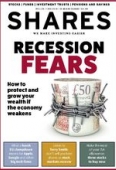Archived article
Please note that tax, investment, pension and ISA rules can change and the information and any views contained in this article may now be inaccurate.
Listen to Terry Smith: don’t sell your best shares as stock markets recover

In reviewing the performance of the Fundsmith Equity Fund (B41YBW7) for 2021, fund manager Terry Smith said the fund ‘makes money with old friends’, referring to a group of stocks in his portfolio that regularly appear in the annual list of top contributors to performance.
‘This tells you to run your winners,’ says Smith. ‘A bit like gardening, the general idea in fund management is to water the flowers and pull up the weeds, not the other way around which an awful lot of people do. They take profit on their winners and try and run their losers in the hope they will come right.’
It’s an interesting and relevant point as we see shares start to recover from the recent global market sell-off.
Nervous individuals alarmed at the value of their hard-earned money eroded by falling stock markets may now look to cash out their investments at the first sign of a rebound. This might be the wrong thing to do.
Smith’s comment that some investors are too quick to sell their best holdings and hang on to losers for too long is known as the disposition effect. It is relevant because investors are 26% more likely to realise gains in market downturns according to a new study by Sabine Bernard, Benjamin Loos and Martin Weber.
There is a saying that no-one lost money taking a profit, yet this misses this point that selling now could mean giving up even more gains down the line.
A rising share price is often a sign there is something good about the business so why sell unless you really need to spend that money?
On the flip side, investors should be more ruthless when it comes to investments that haven’t worked out. Too often we see investors hold on to laggards in the hope of their price going back up, but this doesn’t always happen.
As of 23 March, CNN’s Fear & Greed Index had gone from a reading of 19 a week earlier, classified as ‘extreme fear’, to sit at 44 which is still in ‘fear’ territory but getting close to neutral. Investor sentiment seems to be improving following recent market volatility.
The key question is whether this is just a bear market rally. These tend to start suddenly and do not last long.
There remain significant headwinds for consumers and businesses, and with oil prices trading above $115 a barrel you can be sure that inflation pains will hurt for some time.
Investors might therefore be tempted to take profit in a holding which suddenly rebounds given the fragile backdrop.
‘Investors are petrified in a bear market and try not to sell their losers. But when they see an exit sign in the form of an investment that has made a gain while the rest of the portfolio is down, they try to lock that gain in as fast as they can,’ says Joachim Klement, investment strategist at Liberum.
‘And as you might have guessed, that is again exactly the wrong thing to do, since in a bear market, the losers tend to lose even more than normal, so hanging on to them while selling your few winners is really a bad idea.’
DISCLAIMER: Daniel Coatsworth (author) and
Ian Conway (who edited this article) have personal investments in Fundsmith Equity Fund.
Important information:
These articles are provided by Shares magazine which is published by AJ Bell Media, a part of AJ Bell. Shares is not written by AJ Bell.
Shares is provided for your general information and use and is not a personal recommendation to invest. It is not intended to be relied upon by you in making or not making any investment decisions. The investments referred to in these articles will not be suitable for all investors. If in doubt please seek appropriate independent financial advice.
Investors acting on the information in these articles do so at their own risk and AJ Bell Media and its staff do not accept liability for losses suffered by investors as a result of their investment decisions.
Issue contents
Feature
- Make the most of your ISA allowance: three stocks to buy now
- Recession fears: How to protect and grow your wealth if the economy weakens
- How bond fund managers analyse investments and assess risk
- How important are commodities in the Brazilian economy and market?
- Emerging markets: Views from the experts
Great Ideas
- ConvaTec has turned a corner and offers growth and re-rating potential
- AG Barr fizzes to profit ahead of pre-Covid levels
- SDI’s £7.7 million deal to immediately boost earnings
- Homeserve shares surge higher on bid approach
- Value specialist Temple Bar is well placed for inflation and rising rates
- Beat inflation with Diversified Energy’s big dividends
- Strong demand drives gains in logistics, residential and development
- Our faith in the managers is undiminished despite a slow first half
Investment Trusts
News
- What a harsh EU clampdown means for Apple, Google and other big tech firms
- Why Pendragon might be the next auto retail takeover target
- US Treasury yields surge as Fed toughens stance on mounting inflation
- Mark Barnett makes a comeback with new Tellworth equity income fund
- Terry Smith uses Fundsmith investor meeting to criticise Unilever top brass

 magazine
magazine








